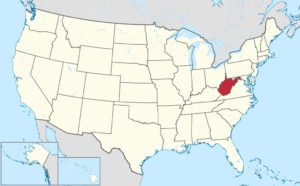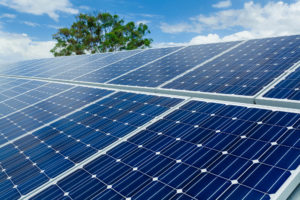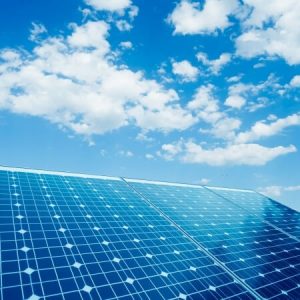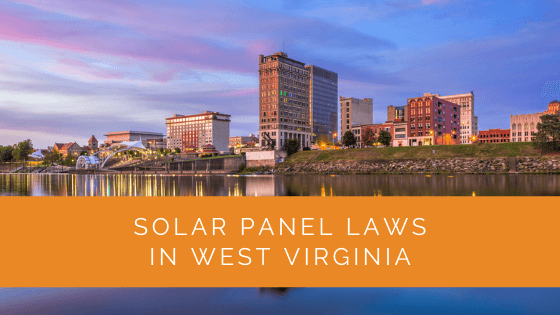 West Virginia is not exactly known as a sunshine state. It has fewer sunny days than the U.S. average – 205 sunny days is the U.S. average, and 164 sunny days is the average for West Virginia. Of the remaining days in the year, 145 days experience precipitation – rain, snow, sleet, frost, etc. What remains is overcast or cloudy.
West Virginia is not exactly known as a sunshine state. It has fewer sunny days than the U.S. average – 205 sunny days is the U.S. average, and 164 sunny days is the average for West Virginia. Of the remaining days in the year, 145 days experience precipitation – rain, snow, sleet, frost, etc. What remains is overcast or cloudy.
However, the state’s sunshine is sufficient to justify changing solar power.
The average cost of solar power installation in West Virginia is $20,000. This may seem like a substantial initial outlay, but discounts are available to bring this cost down to between $11,686 and $14,283.
What you pay depends on your location in the state and the type of solar power system you opt for.
The above figures are based on a 5.7kW system. Generally, a 5kW system is considered sufficient to power the average household.
Below are some discounts you can expect to receive when installing a solar power system in your home in West Virginia.
Contents
- 1 Key Takeaways
- 2 Federal Tax Credits
- 3 Net Metering
- 4 Power Bill Savings
- 5 RPS, Property Tax, And Income Tax Exemption
- 6 Case Study: Residential Solar Installation in Charleston, West Virginia
- 7 Expert Insights From Our Solar Panel Installers About Solar Panel Laws in West Virginia
- 8 Experience Solar Excellence with Us!
Key Takeaways
- West Virginia has fewer sunny days than the U.S. average but still has sufficient sunlight for solar power.
- The average solar power installation cost in West Virginia is around $20,000, but discounts are available, bringing it down from $11,686 to $14,283, depending on location and system type.
- Homeowners in West Virginia can benefit from Federal Tax Credits, net metering, and substantial power bill savings, making solar power a financially viable investment despite the state’s limited renewable energy incentives.
Federal Tax Credits
As part of the initiative to encourage homeowners to switch to solar power, the Federal government has instituted a tax credit program. The program allows 30% of the cost of installing a solar power system between 2022 and 2032 to be credited against the federal taxes owed. It is not a discount but a credit for paying your taxes.
However, West Virginians are encouraged to take advantage of the Federal Tax Credit initiative sooner rather than later. Starting from 2033, the tax credit will decrease, decreasing to 26% in 2033 and further reducing to 22% in 2034. No maximum limit on the amount can be claimed under this credit.
Net Metering
Net metering is a system instituted where solar power users can connect to the grid to supply it with any unused power generated by the solar system. This unused power is distributed through the grid to other users who require power.
A solar power customer will then receive a monthly bill for the number of kilowatts they used from the grid less than the amount of unused solar power their power system generated.
This is a critical incentive program in West Virginia due to the less-than-average sunny days experienced in the state. It means that when your solar power is insufficient to power your home, you can use grid power, knowing that you will be credited with the amount of unused solar power the system generates on sunny days.
Once your solar power system has been installed, you must apply for net metering to benefit from these credits. Once again, this is not a discount. However, the credits you receive will save you money on your monthly utility bill, which can offset the initial solar power installation cost.

Power Bill Savings
Perhaps the most significant savings you will experience when you switch to solar power are not paying for the sun’s power. Solar power can save you up to $1,500 annually on your electricity bill. This figure is based on the installation of a 5.7kW system.
However, the fewer sunny days in West Virginia again come into play, and you can expect a saving of around 9% less than the national average. This amounts to a saving of about $1,350. This is still a significant saving, and when offset against the installation costs, your solar system will pay for itself within 6 to 7 years.
This is, of course, considering the Federal Tax Credit you will receive. It doesn’t, however, consider net metering, which will save you even more. After 6 or 7 years, your savings from going solar will go back into your pocket.
RPS, Property Tax, And Income Tax Exemption
Unfortunately, renewable energy has not been a priority in West Virginia for several years. While the state initially signed up for the nationwide solar energy initiatives introduced in 2009, this was repealed in 2015.
As of 2015, you could no longer receive any rebates, credits, or other incentives from the state to install solar power.
The state also doesn’t allow for property tax exemption. Solar power is considered to be a home improvement. Home improvements increase the value of your property. Increased property value means that you are paying more in property taxes.
Many states exempt solar installation from increasing your property tax because the home improvement is also of value to the state. This is not the case in West Virginia.
Income tax credits went the same way as the RPS incentives once offered. You can no longer receive credits towards the income tax you owe for installing solar power, which was once the case in West Virginia.
While it is unfortunate that the state has put renewable energy on the back burner for now, it doesn’t reflect poorly on solar power for households in West Virginia.
A solar power system can save you thousands of dollars and is a good investment for increasing your property’s value.

Case Study: Residential Solar Installation in Charleston, West Virginia
Background
In Charleston, West Virginia, we encountered a family eager to switch to solar energy to reduce their electricity bills and environmental footprint. Despite the area’s limited sunny days, they were committed to leveraging solar power.
Project Overview
The project involved installing a 5.7kW solar power system on their residential property. The initial cost was approximately $20,000, but after federal tax credits and available discounts, the price was reduced to around $13,000.
Implementation
We began by conducting a thorough site assessment to determine the best placement for the solar panels. Given Charleston’s average of 164 sunny days per year, optimizing the angle and orientation of the panels was crucial. We used advanced mapping tools to ensure maximum sunlight exposure.
Next, we navigated the regulatory landscape, ensuring compliance with West Virginia’s solar laws and securing the necessary permits. The Federal Tax Credit program was a significant factor, providing a 30% credit on installation costs, making the financial aspect more manageable for the homeowners.
Additionally, we enrolled the homeowners in the net metering program. This allowed them to feed excess energy back into the grid, earning credits to offset their utility bills during less sunny periods.
Results
The installation was completed within a month, with immediate benefits observed. The solar power system generated sufficient energy to meet most of the household’s needs, even on days with less sunlight. The net metering program further enhanced their savings, effectively balancing their electricity consumption throughout the year.
Financially, the family saw a reduction in their electricity bills by approximately $1,350 annually. Considering the federal tax credits and net metering benefits, the system’s payback period was estimated to be around 6 to 7 years. This case demonstrates how even in areas with fewer sunny days, solar power can be a viable and cost-effective solution.
Summary
This project in Charleston, West Virginia, showcases how Solar Panels Network USA successfully implemented a residential solar power system, navigating regulatory requirements and optimizing installation for maximum efficiency. By leveraging federal tax credits and net metering, the homeowners achieved significant financial savings and contributed to a sustainable future. This case underscores the potential of solar energy in regions with less-than-ideal sunlight conditions, reinforcing our commitment to bringing solar power to every corner of the United States.
Expert Insights From Our Solar Panel Installers About Solar Panel Laws in West Virginia
As an experienced solar installer, I can assure you that despite West Virginia’s fewer sunny days, the state’s solar potential is promising. The federal tax credits and net metering can significantly offset initial costs, making solar a viable option for many homeowners.
Senior Solar Technician
Installing solar panels in West Virginia requires careful planning due to the state’s varied weather. However, with the right system, homeowners can maximize their energy savings and contribute to a greener environment.
Lead Solar Engineer
The most significant advantage of solar installations in West Virginia is the long-term savings on electricity bills. With federal tax incentives, homeowners can see a return on investment in just a few years.
Solar Energy Consultant
Experience Solar Excellence with Us!
Trust in Solar Panels Network USA, where our seasoned experts deliver top-quality solar solutions for homes and businesses nationwide. With a legacy of countless successful installations and a commitment to sustainable energy, we’re your reliable partner in the solar journey. Ready for a brighter, eco-friendly future? Call us now at (855) 427-0058 and harness the power of the sun!
Map image by Wikimedia Commons User: TUBS / CC-BY-SA-3.0
About the Author
Solar Panels Network USA stands at the forefront of solar energy solutions, driven by a team of seasoned solar engineers and energy consultants. With over decades of experience in delivering high-quality solar installations and maintenance, we are committed to promoting sustainable energy through customer-centric, tailored solutions. Our articles reflect this commitment, crafted collaboratively by experts to provide accurate, up-to-date insights into solar technology, ensuring our readers are well-informed and empowered in their solar energy decisions.

